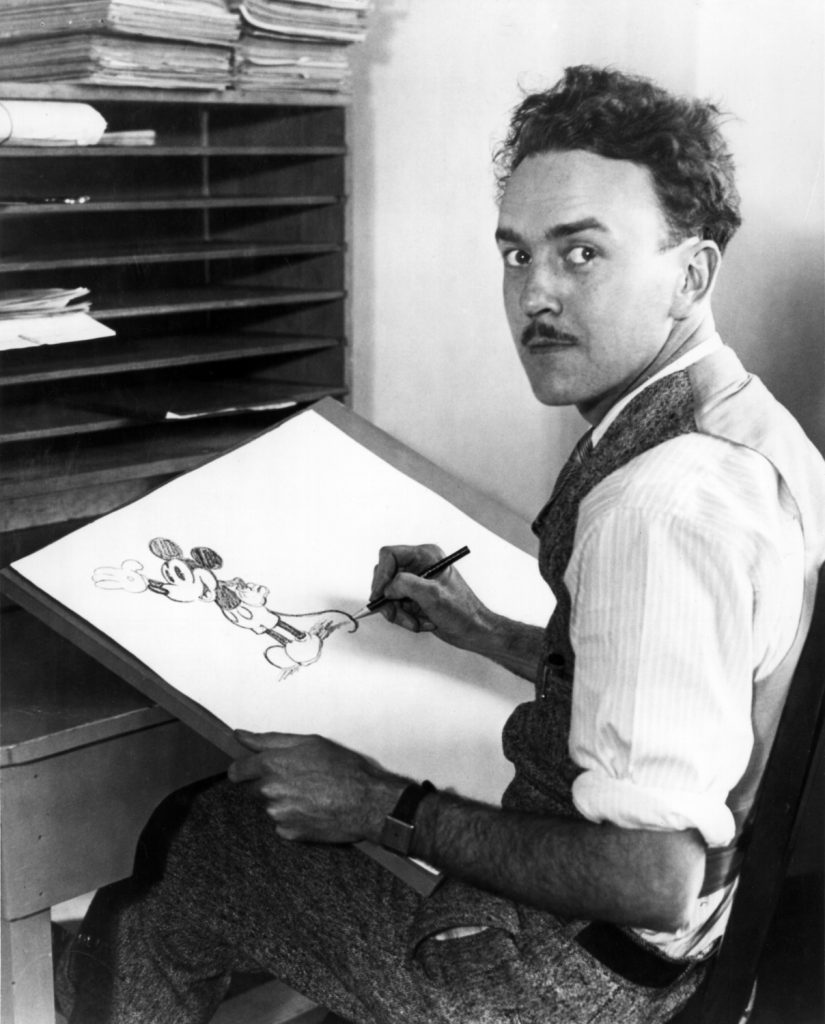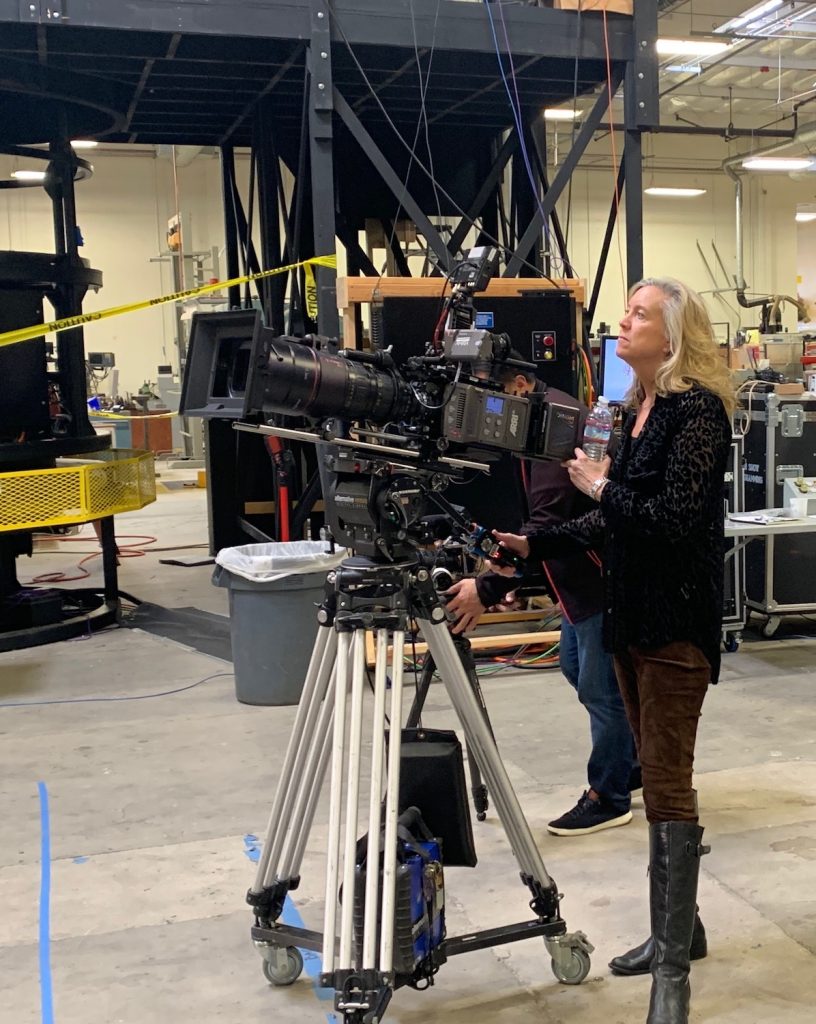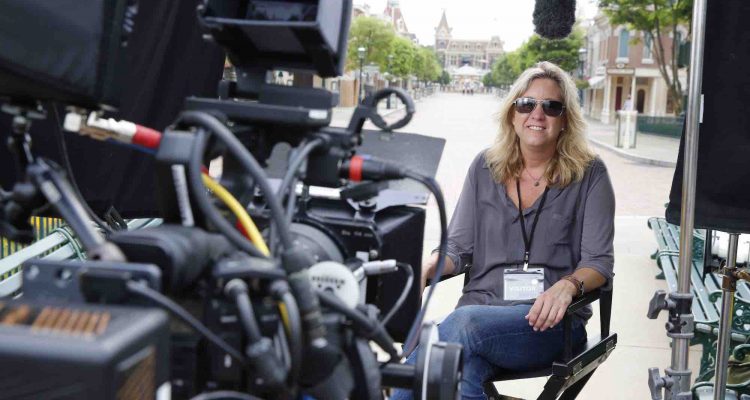“The majority of the documentary is told in first person because we wanted this to feel very personal,” says filmmaker Leslie Iwerks. “The level of true passion that the Imagineers have day in and day out really stuck with me.”
Filmmaker Leslie Iwerks is incredibly gracious and honest, proving that the famed interviewer is just as fantastic on the other side of the microphone. As the granddaughter of animation genius Ub Iwerks (and the daughter of Disney Legend Don Iwerks), Leslie Iwerks was raised in a family that has shaped The Walt Disney Company.
Leslie Iwerks’ work as a documentary filmmaker has covered a wide range of topics, from environmental concerns (Recycled Life & Dirty Oil) to the video game industry (League of Legends Origins). Iwerks interests are vast, but she’s devoted a great amount of her creative life detailing elements of the Walt Disney Company’s history. Notably, The Hand Behind the Mouse: The Ub Iwerks Story – which explored the life of her grandfather – and The Pixar Story – which detailed Pixar’s early years.
Iwerks’ latest project, The Imagineering Story, is an in-depth six episode series that offers never before seen footage and insights into the creation of Disneyland and so many attractions.
Awards Focus spoke to Iwerks ahead of Emmy nominations, discussing the expansive process of building the well-reviewed series that was originally envisioned as a ninety-minute film.
Awards Focus: Coming from a family of Disney legends, how does that relationship affect your storytelling in regards to a project like The Imagineering Story?
Leslie Iwerks: Well, I think that having grown up around Disney and behind the scenes, at the parks, on the lot, and my dad making all sorts of contraptions for films, it gave me a foundational understanding as to what Disney is all about.
I developed a real fascination for how Disney does what it does, how Imagineers do what they do, and it was always a fun and fascinating look at entertainment from behind the scenes.
Being part of the Disney family from such a young age helped me craft The Imagineering Story because it allowed for a certain level of trust for Disney to have with me, so much so that I got unprecedented access that they’ve never given anyone else. And I think that between my past films – such as The Hand Behind the Mouse and The Pixar Story – and my personal connection to the company, those two things helped solidify the access that Disney gave me.
AF: And in terms of prized heirlooms, what are some things that you cherish the most that you have at your home or that are with other family members?
Leslie Iwerks: That’s a great question and one I’ve not been asked. There’s a photo of my grandfather Ub Iwerks designing Mickey Mouse. I’m sure you’ve seen it, the drawing of Micky on his drawing board in front of him. Well, he’s wearing a watch, and that watch was given to me by my dad two years ago for my birthday and he’s had it all these years.

(Photo Courtesy of Disney)
There’s also this beautiful gold stemware set that was given to my grandparents on their wedding day by Walt and Lillian. And that set of beautiful gold rimmed stemware and goblet wine glasses are in my house. So, those are lovely to see every day.
AF: You’ve built an incredibly versatile career having worked on subjects such as video game communities, environmental harm, and poverty. In what ways do you leave your signature on your work?
Leslie Iwerks: Well, I believe that inspiration and heart make a good documentary and that is something I feel is a trademark of my work. I try to find stories that will resonate with audiences, make them see something in a new light, hopefully make them change their point of view, enlighten them to new information, but also hopefully make them act; make them inspired to act or follow a certain path that perhaps they were reluctant to follow.
AF: In regards to Marty Sklar, who approached you after seeing The Pixar Story, you said you got unprecedented access from Disney. I was wondering if there were any roadblocks that you had to navigate as you’re going through the archives?
Leslie Iwerks: I think the roadblocks were really just the amount of material that we had to go through. It was enormous, and enormous is an understatement. We were looking at 60 years of footage and every park has its own archives. The Disney Company has its own archives, which is huge and vast thanks to the original archivist Dave Smith, who started recording things and gathering material in the 1970s.
Imagineering also has its own archives, which includes tapes and film reels and material on hard drives that had recordings of test footage, audio interviews, video interviews, photographs, behind the scenes, and making of materials.
It took about a year just to go through all that material. And we were going through the archives while filming simultaneously. So, the trickiest part was sort of mashing up what we wanted to film, what we felt the story was, and what the archives had to support those story points. It was always a back and forth of, “Do we have enough material to support this one storyline?”
A wonderful part about the work that we did was that we found a lot of material that had never been seen prior to the documentary. It was just a great opportunity to mine the archives and really try to find people that hadn’t been in the spotlight enough.
Originally, this was intended to be a ninety-minute film and commissioned to be filmed over five years just to document all the behind the scenes, the making of stories, and the trials and tribulations. After five years, we had two hundred interviews and hundreds of hours of archival material, so it was tricky to try to find the find the thread about the Imagineers. We went down a lot of avenues, we circled back, we found a different spine – you know, it was just the typical process of documentary filmmaking in finding the narrative.

(Photo Courtesy of Disney)
We were always keen on the fact that we wanted this to be a story of the Imagineers. This was the group of people that Walt Disney found and shepherded, and handpicked to build what he called the happiest place on Earth. So, our motto was, “Walt created the happiest place on Earth, but creating happiness is hard work.” That was the story that we set out to tell.
AF: In terms of managing the content, what kind of team did you assemble? Did you try to balance you time between creating new content and managing the archived material?
Leslie Iwerks: It started out with one editor. I’d been filming with my production crew for about three years or four years, and decided to bring in one editor to help me craft all this material. That editor was Mark Catalina, and he was incredibly excited about the subject matter and we just then started mapping out the project.
I handed him a notebook of all these different transcripts and told him to have fun. I’d already highlighted and made notes of key quotes, but what it needed was harnessing of all that information and funneling it down into a tight story.
We had a big cork board in our office the size of the whole wall and we just started putting up three by five cards to map out what we thought would be various spines and sub-spines and threads. Unbeknownst to us at the time, you look at that board and we ultimately crafted the six-hour series. We knew that all these big beats had to be supported, so we really just laid out all the main turning points of Imagineering’s sixty-plus-year history.
I’d also spent a considerable amount of time with Marty Sklar prior to his passing. I went to his house several times and we’d talk on the phone and email. It was through those communications that he gave me the history and really told me what he felt would be the amazing story of Imagineering.
Who better than Marty Sklar, who had known and worked with Walt and guided the ship for so many years? Sklar’s input was the foundation for the film that I presented to Mark Catalina. Once we got new interviews, we were able to fill out other holes because doing a documentary of this scope means you’ll have threads that need connecting or further fleshing out.
Overall, what you see in the film are the real turning points, hard facts, and entertaining bites. And the majority of the documentary is told in first person because we wanted this to feel very personal from the inside out and not from critics or other outsiders. We did interview some third-party people who just admired Imagineering or were inspired by Imagineering but I didn’t include them because we just felt that this was really the Imagineering story.
AF: You talked a bit about things that were discovered when doing research. What were some of the more surprising things you learned? Was there something that really stuck with you?
Leslie Iwerks: The level of true passion that the Imagineers have day in and day out really stuck with me. I’ve done films on Pixar and on my grandfather, and on Walt, and on Industrial Light & Magic. When I worked with Riot Games to develop The League of Legends documentary on Netflix, I was able to explore the business and creativity needed to build the number one game in the world.
What was illuminating to me was how this group of artists and creators in this division basically survived all these ups and downs, through decades of challenges and regime changes and economic downturns and even environmental disasters. Now they have to deal with COVID, which is not in the series.
The parks are something that Walt always believed would be the brick and mortar version of his entertainment giant’s IP. He built the first Disneyland, yet he never saw Walt Disney World and the Magic Kingdom come to fruition… to think that all these many years later, there are these parks around the world that are standing and every generation around the world goes to them with their kids.
Additionally, the building Shanghai Disneyland was also something that was I was privy to from its very beginning. From its groundbreaking ceremony to opening day, we documented the making of that park. We went back once or twice every year, going deep inside the work of the Imagineers were doing.
They focused on the smallest details to the biggest picture while meeting deadlines. It was very eye opening to see what it takes to build a theme park and I only got one sliver of that process because I wasn’t there day in and day out like they were, but it was really an honor to be able to document that and get a sense of what it takes.
AF: Disney fans have an immense knowledge of the company and they’re very passionate. What is the most interesting fan encounter you’ve had over the years?
Leslie Iwerks: I had a recent one that offered a bit of closure on the documentary. A funny thing about doing a film for seven years and then finally putting it on a streaming service, is you don’t necessarily get that visceral reaction from the fans.
I read the posts on Instagram, Facebook, and Twitter and they were wonderful to read, but I didn’t get to connect with an audience. Jump ahead to when my dad, Don Iwerks, was invited to the Club 33 to speak about his most recent book that he wrote called Walt Disney’s Ultimate Inventor: The Genius of Ub Iwerks. We had dinner at Club 33 and then road the Pirates of the Caribbean ride with my family.
On the ride, there were two guests that we didn’t know sitting in the back row. I could hear them behind me as the as the ride ended and they said, “That was so cool. I remember seeing this whole story about Pirates of the Caribbean on The Imagineering Story and I loved the show.”
I heard them say that behind me, and it just felt so validating. That after all that hard work to just know that random strangers really enjoyed it meant a lot to me, because now they’re seeing the ride in a whole new way because of the show, and because of the stories that the Imagineers told in that scene.
Byron Burton also contributed to this article.


